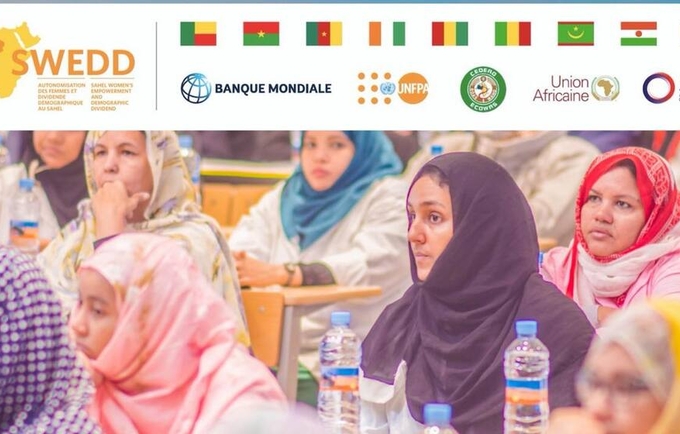Dakar, Senegal / Bobo-Dioulasso 01, Burkina Faso – 10 February, 2022: To promote inter-regional and inter-institutional cooperation and collaboration, the Director-General of the West African Health Organisation (WAHO) and the Regional Director of the United Nations Population Fund (UNFPA) are undertaking a courtesy and advocacy missions to the non-ECOWAS SWEDD countries namely Mauritania, Chad and Cameroon from February 10 to 20, 2022.
This mission will provide an opportunity for the Director-General of WAHO and the UNFPA Regional Director to pay a courtesy visit to these countries and also present the expanded role of ECOWAS-WAHO that has an enhanced focus on gender in the Phase 2 of the SWEDD Project.
According to the WAHO Director General, Professor Stanley Okolo, “The strategic importance of the mission cannot be overstated. By pulling together resources and leveraging their comparative advantages, we aim to leverage our partnership and advocacy to enhance the use of of regional legal frameworks to increase the empowerment of girls, adolescents, and women. Phase 2 of the SWEDD project focuses, particularly on strengthening the existing legal frameworks by the development of regional Directive and Guide for Sexual and Reproductive Health and Right (SRHR).”
The regional Directive was developed with the aim to have a harmonized legislation within ECOWAS Member States that conforms to international norms and standard on SRHR. This Directive seeks to promote the enrolment and retention of girls in school, adolescent reproductive health, advocate for the reduction of unmet need for family planning and preventable maternal deaths, support actions against Gender-Based Violence (GBV) and other harmful practices, support the reinforcement of legal pressure on the authors, actors and accomplices of cases of female genital mutilation (FGM) and to dissuade FGM all along the borders of countries with a high prevalence of FGM.
This mission will allow for high-level advocacy around this ECOWAS directive with a view to its adoption in Central Africa. It is also an opportunity to learn on the ground about national issues related to access to sexual and reproductive health, which is essential for the implementation of quality technical assistance. The mission, which is taking place in non-ECOWAS SWEDD countries, will help anchor the spirit of strategic partnership that characterizes the project, which was launched by the Heads of State of the nine member countries (Benin, Burkina Faso, Cameroon, Chad, Côte d'Ivoire, Guinea, Mali, Mauritania, and Niger) and is financed by the World Bank to the tune of US$680 million.
“UNFPA is pleased to join forces with WAHO and ECCAS, key regional institutions to advocate for the implementation of the Regional Directives and Guide for SRHR, which will significantly contribute to achieving its three transformative results of ending preventable maternal mortality, ending unmet need for family planning, and ending Gender-Based Violence, and harmful practices by 2030,” Remarked Argentina Matavel Piccin, UNFPA Regional Director for West and Central Africa.
Sub-Saharan African (SSA) still accounts for about two-thirds of maternal deaths in the world in 2017. It has the highest proportion of women with unmet contraception need, with nearly 25% of women of reproductive age. FGM is still being practiced among certain communities in 29 countries in SSA, 17 of which are Western and Central African countries.
The courtesy visits will be made to the Ministries of Health, Ministries hosting the SWEDD Project (Population, Social Affairs, Poverty and Gender), the National Medicines Regulatory Authorities (NMRAs) and National Medicines Quality Control Laboratories (NMQCLs), the Clinical mentorship Centre of Nouakchott (Mauritania), religious and traditional leaders, advocating for the strengthening of legal frameworks in the remaining Regional Economic Blocs (RECs) of Africa.
Media Contacts:
UNFPA WCARO:
Ms. Marie Chantal Uwitonze, Communication Specialist, uwitonze@unfpa.org
Mr. Jacob Enoh Eben: Communication Advisor, eben@unfpa.org
WAHO:
Ms. Oluwafunmike SOPEIN-MAN, SWEDD Coordinator, osopein-mann@prj.wahooas.org
UNFPA Mauritania:
Mr. Mamoudou Ba, Communication and Resource Mobilization Officer, maba@unfpa.org
UNFPA Chad:
Mr. Tchouafene Matchoke, Population & Development Program Analyst, matchoke@unfpa.org
UNFPA Cameroon:
Mr. Mbea Mbea: Communication Expert, mmbea@unfpa.org

